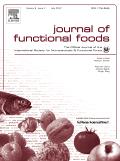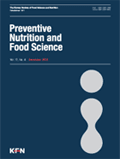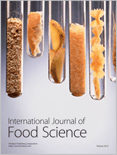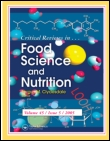
Journal of Functional Foods
Scope & Guideline
Fostering Collaboration in Functional Foods Research
Introduction
Aims and Scopes
- Functional Foods and Health Promotion:
The journal covers studies that explore the health-promoting effects of various functional foods, including their roles in disease prevention and health enhancement. - Bioactive Compounds and Metabolism:
Research on bioactive compounds found in foods, such as polyphenols, flavonoids, and other phytochemicals, is a core focus, examining their metabolic effects and mechanisms of action. - Gut Microbiota and Nutritional Science:
The relationship between diet, gut microbiota, and health is extensively explored, highlighting how functional foods can modulate gut microbiota composition and activity. - Clinical Trials and Meta-analyses:
The journal publishes clinical trials and systematic reviews that evaluate the efficacy of functional foods and dietary interventions on health outcomes. - Innovative Food Technologies:
Research related to food processing, formulation, and technology that enhances the bioavailability and health benefits of functional foods is also a significant aspect of the journal.
Trending and Emerging
- Microbiome and Functional Foods:
Research exploring the interaction between functional foods and gut microbiota is rapidly growing, emphasizing the importance of gut health in overall well-being. - Personalized Nutrition and Functional Foods:
Emerging studies focus on personalized nutrition approaches that tailor functional food recommendations based on individual genetic, metabolic, or microbiome profiles. - Functional Foods in Chronic Disease Prevention:
There is an increasing emphasis on the role of functional foods in preventing chronic diseases, such as diabetes, cardiovascular diseases, and obesity, highlighting their potential therapeutic effects. - Sustainable and Plant-Based Functional Foods:
Research into sustainable and plant-based diets, including the health benefits of plant-derived functional foods, is gaining traction as consumers increasingly seek environmentally friendly nutrition options. - Innovative Food Processing Techniques:
Advancements in food processing technologies that enhance the bioavailability and efficacy of functional food components are becoming a prominent area of study.
Declining or Waning
- Traditional Medicinal Foods:
There has been a noticeable decrease in studies focusing solely on traditional medicinal foods, as the journal shifts towards more contemporary functional foods and their mechanisms. - Animal Studies in Isolation:
Research that solely focuses on animal studies without a clear translational aspect to human health outcomes has become less prominent, reflecting a move towards more integrative approaches. - Basic Nutritional Studies:
Basic studies on the nutritional composition of foods without functional implications are less frequently published, as the journal prioritizes research that connects food components to health benefits. - Single Nutrient Focus:
Research that examines the effects of single nutrients in isolation, rather than their synergistic effects within whole foods, has seen a decline as the focus shifts to holistic dietary patterns.
Similar Journals

Preventive Nutrition and Food Science
Advancing the Science of Nutrition for a Healthier FuturePreventive Nutrition and Food Science, an esteemed journal published by the Korean Society of Food Science and Nutrition, serves as a pivotal platform for the dissemination of innovative research and insights in the fields of food science, nutrition, and dietetics. With an ISSN of 2287-1098 and an E-ISSN of 2287-8602, this journal is dedicated to advancing knowledge from 2012 through 2024, showcasing contributions that reflect the interplay between nutrition, health, and preventive strategies. Indexed in Scopus, it proudly holds a Q2 ranking in Food Science and a Q3 ranking in Nutrition and Dietetics as of 2023, positioning it among influential publications within these disciplines. Researchers, professionals, and students can explore cutting-edge studies that contribute significantly to evidence-based practices, enhancing public health and nutritional care. Although it operates under a subscription model, the journal plays a crucial role in fostering a deeper understanding of preventive nutrition, advocating for advancements that address contemporary dietary challenges.

Food Frontiers
Connecting Researchers to Shape the Future of FoodFood Frontiers, an esteemed publication in the Food Science domain, is proudly published by WILEY. Launched as an Open Access journal in 2020, it aims to facilitate the dissemination of high-quality research that influences contemporary food science and technology. The journal, with an E-ISSN of 2643-8429, has rapidly ascended to a Category Quartile ranking of Q1 in the Food Science category as of 2023, and boasts an impressive Scopus rank of #31 out of 389 in Agricultural and Biological Sciences, placing it in the 92nd percentile. The journal's mission is to explore innovative approaches to food production, safety, and sustainability, making it an essential resource for researchers, industry professionals, and students eager to stay at the forefront of food science advancements. With a commitment to open accessibility, Food Frontiers fosters collaboration and knowledge sharing across the globe, addressing the critical challenges and trends in feeding the world sustainably.

International Journal of Food Science
Championing Excellence in Food Science ScholarshipThe International Journal of Food Science, published by HINDAWI LTD, stands as a crucial platform for advancing knowledge within the realm of food science. Established in 2013, this Open Access journal based in Egypt has garnered significant recognition, achieving an impressive Q2 classification in the 2023 Food Science category, which reflects its commitment to quality and impactful research. With a Scopus rank of #88 out of 389 in Agricultural and Biological Sciences and placing in the 77th percentile, this journal serves as an essential resource for researchers, professionals, and students dedicated to innovative developments and scientific exploration in food science. The journal not only provides unrestricted access to valuable research but also aims to foster collaboration and dissemination of knowledge on critical issues affecting food safety, nutrition, and technology. For those looking to keep abreast of the latest advancements, the International Journal of Food Science is certainly an indispensable addition to their academic pursuits.

eFood
Transforming food systems with open-access knowledge.eFood is a pioneering journal in the field of food science, published by the esteemed WILEY. With its impactful emergence, the journal has rapidly established itself within the academic community, evidenced by its impressive Q1 category ranking in Food Science as of 2023, and a commendable position at Rank #95 out of 389 in the Scopus database. Covering a wide spectrum of topics related to food innovation, technology, safety, and nutrition, eFood serves as an indispensable platform for researchers, industry professionals, and students who are at the forefront of advancing our understanding of food systems. The journal notably operates with an open-access model, promoting wide dissemination of knowledge while enhancing the visibility of high-quality research. As we look forward to converging years from 2020 to 2024, eFood is poised to foster rigorous scientific discourse and contribute significantly to the future of food science research.

Food Science and Human Wellness
Fostering Global Collaboration for Food Safety and HealthFood Science and Human Wellness, published by TSINGHUA UNIVERSITY PRESS, is an esteemed open-access journal that has been at the forefront of advancing research in the interdisciplinary fields of food science and human health since its inception in 2012. With an impressive impact factor indicative of its quality and relevance, this journal holds a prestigious Q1 ranking in Food Science according to 2023 metrics, reflecting its commitment to high-caliber research and innovation. The journal is positioned within the top 12% of its category, ranked 46th out of 389 in Agricultural and Biological Sciences. The journal not only publishes original research articles but also critical reviews, perspectives, and innovations that contribute significantly to our understanding of the relationship between nutrition, wellness, and food science. With its Open Access model, Food Science and Human Wellness ensures that its valuable content is available to a global audience, fostering collaborative advancements in this vital field. Researchers, professionals, and students are invited to explore insightful discussions and impactful studies that aim to enhance public health and food safety.

Foods
Exploring the Science of Nutrition and Sustainability.Foods is a premier open access journal published by MDPI, based in Switzerland, that has been at the forefront of disseminating high-quality research in the fields of food science, health professions, and plant science since its establishment in 2012. With an impressive convergence of interdisciplinary studies spanning various aspects of food, nutrition, and microbiology, the journal aims to provide a comprehensive platform for researchers and professionals to share innovative ideas and findings. Maintained as a Q1 journal in multiple categories for 2023, including Food Science and Health Professions, Foods has garnered significant recognition within the academic community, reflected in its strong Scopus rankings and percentiles across various disciplines. The journal not only promotes open access to enhance the visibility and accessibility of research but also encourages the exploration of sustainable food systems and health-related issues, thus contributing to essential discussions in today's society. For those looking to advance their understanding and expertise in food-related sciences, Foods serves as an enduring resource for groundbreaking studies and critical insights.

Journal of Food and Nutrition Research
Pioneering Insights for a Healthier Food FutureJournal of Food and Nutrition Research, published by the VUP FOOD RESEARCH INST in Bratislava, Slovakia, serves as a vital platform for disseminating cutting-edge research in the fields of food science and nutrition. With an ISSN of 1336-8672 and an E-ISSN of 1338-4260, this journal emphasizes the importance of interdisciplinary approaches to address contemporary challenges related to food quality, dietary practices, and nutritional health. Notably recognized in the 2023 Scopus rankings, the journal is classified in Q3 quartiles for both Food Science and Nutrition & Dietetics, providing a forum for researchers aiming to enhance knowledge and practices within these domains. Those engaged in academia and industry will find the journal invaluable for its comprehensive scope, which covers novel food technologies, nutrition interventions, and the implications of dietary behaviors. Though not open access, the journal is dedicated to enriching the academic conversation and contributing to advancements in public health and nutrition policies.

EUROPEAN JOURNAL OF NUTRITION
Advancing Nutrition Science for a Healthier TomorrowEuropean Journal of Nutrition, published by Springer Heidelberg, is a premier outlet for groundbreaking research in the field of nutrition and dietetics. Established in 1996 and set to continue its impactful legacy until at least 2024, this journal enjoys an impressive recognition, holding a Q1 category rank in both Medicine (miscellaneous) and Nutrition and Dietetics, with notable Scopus rankings that place it in the top 10% of its field. The journal facilitates open access options, enhancing the dissemination of knowledge across the globe. It serves as a vital platform for researchers, healthcare professionals, and students, promoting the exchange of innovative ideas and advancements in nutritional science that aim to improve health outcomes worldwide. With a commitment to quality and relevance, the European Journal of Nutrition continues to shape the future of nutrition research and practice.

CRITICAL REVIEWS IN FOOD SCIENCE AND NUTRITION
Advancing Knowledge in Food Science and NutritionCRITICAL REVIEWS IN FOOD SCIENCE AND NUTRITION, published by Taylor & Francis Inc, is a premier peer-reviewed journal dedicated to advancing the understanding of food science and nutrition. With its ISSN 1040-8398 and E-ISSN 1549-7852, this influential journal has established itself as an essential resource in the field, featuring high-quality reviews and critical analyses that foster innovation and knowledge sharing among researchers, practitioners, and academics. Recognized as a Q1 journal in Food Science, Industrial and Manufacturing Engineering, and Medicine (miscellaneous) for 2023, it ranks impressively within the top percentiles of its respective fields, making it a valuable platform for impactful research. Although the journal does not currently offer open access, it continues to attract a readership eager to explore the intricacies of food science and its applications, thereby shaping future advancements in the industry. With an extensive history dating back to 1981 and convergence up to 2024, CRITICAL REVIEWS IN FOOD SCIENCE AND NUTRITION remains committed to providing comprehensive reviews that illuminate contemporary challenges and solutions in the domain of food science and nutrition.

NUTRITION REVIEWS
Advancing the Science of Nutrition for a Healthier TomorrowNUTRITION REVIEWS, published by Oxford University Press Inc, stands as a premier journal in the fields of Nutrition and Dietetics and Medicine, achieving an impressive Q1 ranking in both disciplines for 2023. With a rich history dating back to 1942, this journal serves as a crucial platform for the dissemination of high-quality, peer-reviewed research focused on nutrition science, dietary trends, and their implications for health. Researchers, professionals, and students alike benefit from its comprehensive reviews that bridge the gap between theory and practical application, enhancing understanding and encouraging academic discourse. Although it does not operate under an open-access model, its significant impact factor and dedicated readership underscore its relevance and authority in the field. Covering an extensive range of topics, NUTRITION REVIEWS is committed to advancing knowledge, informing policy, and shaping future research in nutrition.